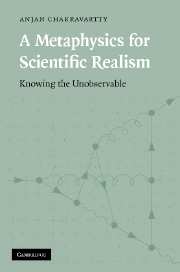Book contents
- Frontmatter
- Dedication
- Contents
- Tables
- Figures
- Preface
- Abbreviations
- Part I Scientific realism today
- Chapter 1 Realism and antirealism; metaphysics and empiricism
- Chapter 2 Selective scepticism: entity realism, structural realism, semirealism
- Chapter 3 Properties, particulars, and concrete structures
- Part II Metaphysical foundations
- Part III Theory meets world
- References
- Index
Chapter 2 - Selective scepticism: entity realism, structural realism, semirealism
Published online by Cambridge University Press: 22 September 2009
- Frontmatter
- Dedication
- Contents
- Tables
- Figures
- Preface
- Abbreviations
- Part I Scientific realism today
- Chapter 1 Realism and antirealism; metaphysics and empiricism
- Chapter 2 Selective scepticism: entity realism, structural realism, semirealism
- Chapter 3 Properties, particulars, and concrete structures
- Part II Metaphysical foundations
- Part III Theory meets world
- References
- Index
Summary
The entities are not alone
Scientific realists invite questions about their metaphysical beliefs, often perhaps unwittingly. In their accounts of scientific knowledge, they routinely invoke not only unobservable entities and processes commonly discussed by scientists, but also things whose natures generally fall outside the remit of the sciences, such as causation, laws of nature, and the idea that scientific taxonomies divide the world into natural categories, or kinds. The recourse to these latter metaphysical notions in support of rea-lism is not problematic per se, but a lack of attention given to spelling them out can have problematic consequences. While these topics are central to metaphysics and many realists investigate them, few offer unified accounts in connection with specific proposals for realism. In the absence of such details, the views of realists are sometimes associated by default with the metaphysical speculations of great, systematic philosophers of the past, from ancient and medieval, up to and including early modern times. Unfortunately for the realist, some of these speculations are outmoded today, especially in a modern scientific context. In this chapter I will begin the process of spelling out in a more detailed way what I believe scientific realism has become, and thereby initiate a proposal for its metaphysical foundations.
Chapter 1 began with a rough, first-approximation definition of realism: scientific theories correctly describe the nature of a mind-independent world. This first approximation, however, is naïve in several respects, and this leaves it open to several immediate objections.
Information
- Type
- Chapter
- Information
- A Metaphysics for Scientific RealismKnowing the Unobservable, pp. 27 - 57Publisher: Cambridge University PressPrint publication year: 2007
